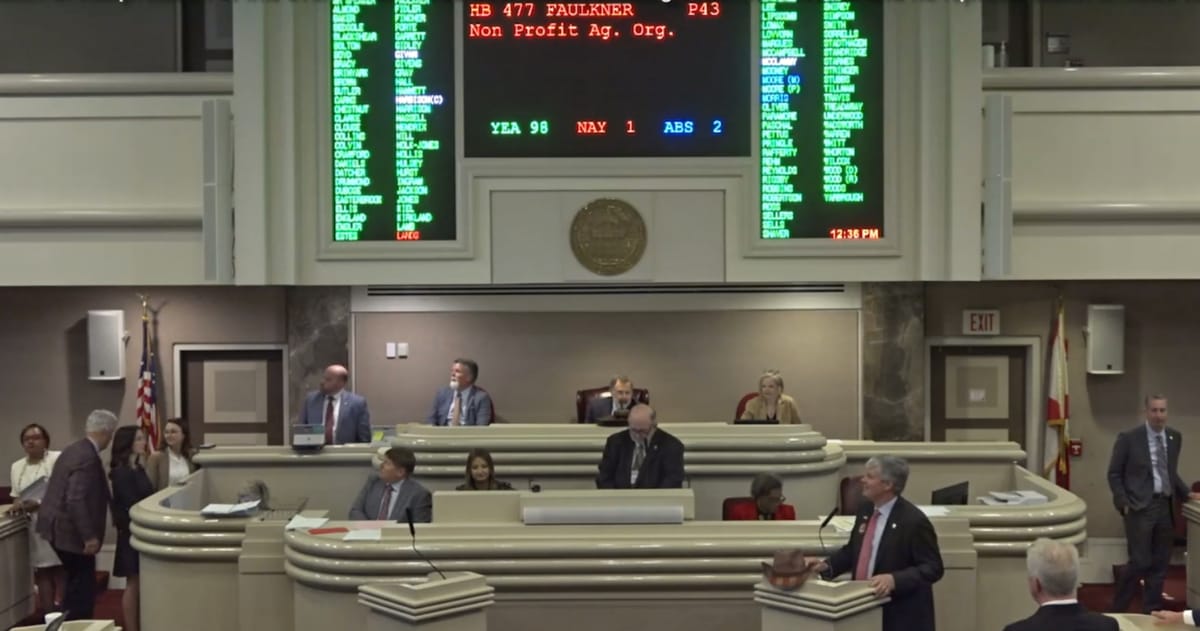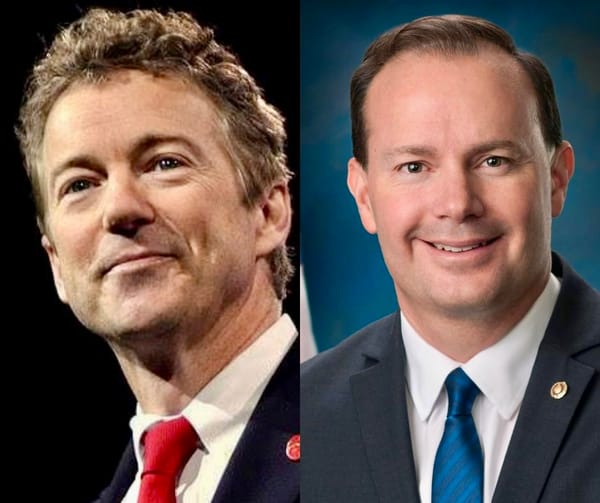ALFA Health Care Bill Passes Alabama House
HB477 will allow the Alabama Farmers Federation to offer self-financed health coverage to members

HB477, a bill that allows the Alabama Farmers Federation (ALFA) to offer its members a self-financed health care plan passed the Alabama House by a vote of 98-1 on Thursday. The bill was subjected to extensive debate on the House floor for over 2 hrs 40 minutes before the final vote was cast.
The bill was brought by State Representative David Faulkner (R-Birmingham), who opened the floor debate by emphasizing the importance of agriculture and forestry in Alabama, and how this bill will improve the lives of Alabama’s farmers, foresters and other small businesses. Editor’s note: Rep. Faulkner’s full opening remarks are available at the end of this article.
“We all know how much agriculture and forestry means to this state. Agriculture and Forestry are Alabama’s largest economic forces. They directly support 275,000 jobs. They pay $15 billion in wages and contribute almost $80 billion to local and state economies. Our number of Alabama farms, though decreased, by 8% from 2017 to 2022. Members, 95% of Alabama’s 37,000 farms are family-owned,” Faulkner said.
“The rising cost of healthcare is a significant burden for our farmers. As legislators, there is little we can do about fertilizer costs or the price of cotton, but we can make a difference in one of the largest household costs for many farmer families and other citizens in Alabama regarding their healthcare coverage.
“This is not a plan for everyone. This is a plan that is offered to the members of the Farmers Federation. Ten other states have done it and have it in place, and it’s working really well. The Tennessee Farm Bureau has a 98% retention rate. Tennessee has been doing this since 1947.
“These ALFA health plans have the potential to save farmers and other self-employed families 30% to 60% on their health care coverage,” Faulkner said.
Rep. Juandalynn Givan (D-Birmingham) immediately rose to question the availability of the plan. She enquired if there were any Black members of the ALFA family, to which Mr. Faulkner replied that there were indeed, but he had not counted them according to their race. Ms. Gavin returned to the well late in the debate to denounce the bill as an attack on the Affordable Care Act.
Rep. Neil Rafferty (D-Birmingham) was concerned about the effects of this bill on a possible Medicaid expansion in the future, to which Mr. Faulkner replied “this plan doesn’t affect Medicaid, whether you expand it or don’t.”
A substitute bill was brought which included several amendments, one of which (the addition of substance abuse) was offered by Mr. Rafferty. Other additions include a prescription drug benefit explicitly added to the bill, a clarification that only licensed agents could sell the plan, and the provision that once covered, you cannot be cancelled for a single health event.
Rep. Faulkner commented that other states have these provisions in their plans, but only Alabama’s bill had them incorporated into the law.
Several members questioned the removal of what Faulkner called a “vague” amendment requiring the Department of Insurance to enforce the act. Faulkner stated that the Department of Insurance does not regulate self-funded health plans, which this bill would create. Other members questioned why this bill was required to form such a plan, and other entities could form similar plans. Faulkner replied that other plans like this would indeed need similar legislation in the future.
During the floor debate, it was discussed that the plan would utilize the UnitedHealthcare network, and be administered by the Tennessee Farm Bureau. Some critics of the bill have privately expressed concern to ALPolitics.com about the association with UnitedHealthcare due to their very low rate of patient satisfaction (65% of customers were “very unsatisfied” and 13% were “unsatisfied” in one survey) and significant reports of claims denials and other problems with the company. Another survey, reported by Consumer Affairs, had 92% “one star” ratings for the company from 2,349 responses. However, the UnitedHealthcare issue was not brought up on the House floor on Thursday.
Following a lengthy debate, HB477 was passed by a vote of 98 YEA, 1 NAY, with 2 abstentions. The bill now goes to the State Senate for further consideration.
Rep. Faulkner’s full opening remarks on HB477:
“We all know how much agriculture and forestry means to this state. Agriculture and Forestry are Alabama’s largest economic forces. They directly support 275,000 jobs. They pay $15 billion in wages and contribute almost $80 billion to local and state economies. Our number of Alabama farms, though decreased, by 8% from 2017 to 2022. Members, 95% of Alabama’s 37,000 farms are family-owned.
“The rising cost of healthcare is a significant burden for our farmers. As legislators, there is little we can do about fertilizer costs or the price of cotton, but we can make a difference in one of the largest household costs for many farmer families and other citizens in Alabama regarding their healthcare coverage.
“The Alabama Farmers Federation is seeking authority to offer its members a health plan coverage similar to successful programs in other states. Ten other states already have a Farm Bureau health plan for their members.
“Let me say again, this is not a plan for everyone. This is a plan that is offered to the members of the Farmers Federation. Ten other states have done it and have it in place, and it’s working really well. The Tennessee Farm Bureau has a 98% retention rate. Tennessee has been doing this since 1947.
“These ALFA health plans have the potential to save farmers and other self-employed families 30% to 60% on their health care coverage.
“The reason these plans are so vital is because farmers and other small business owners often fall into a coverage gap. They earn too much to qualify for federal subsidies but not enough to pay the full cost for health insurance. It is not uncommon for a farm family to pay $2,000-$2,500 a month for health care coverage, often twice their home mortgage.
“I mentioned to you that ten other states have this. Five other states are DJ sidering this plan, just like we are right now.
“What I want to tell you about this plan that I have before you in this bill is that we have worked with so many people to make this the most comprehensive plan that it can be. Folks, this plan is so much more comprehensive than any other Farm Bureau plan in the country. We have made numerous changes, and I will quickly…run down these changes that we’ve accepted to this bill.
“First, I want to say ‘thank you’ to the people who worked with us on this bill. We worked with Blue Cross. We worked with BCA. We worked with hospitals to address concerns, and I appreciate all the time and input from them.
“We have taken about sixteen or seventeen amendments to this bill. This bill has the requirement of reinsurance by a separate company that’s independent from ALFA, to make sure the reinsurance is there. It has an actuarial report that has to be submitted to show that our reserves are in place. It has a complaint review process the same, and substantially similar to the Department of Insirance that they use, and we’ve set up an Ombudsman to be in contact with the Department of Insurance in regards to any complaints that are ever made.
“We have put in the Prompt Pay law. We have put in the federal No Surprises Act, and we have put in network language, to ensure all covered services are provided by in-network providers whenever possible.
“In response to the BCA, this will not be plans sold to those who have health insurance through their employer, and we have limited who can sell this. And, in the Health Committee, we put into the bill that, once you were covered by this, you will not be dropped, or your premium raised, for an individual health event.
“I thank Chairman Lee and the Health Committee for those amendments we took, except for one, and the ones that we took added a couple of benefits.
“Members, and those listening and those in the gallery, I want you to know that this bill is by far and away, the law in this state will be far more comprehensive than any (other) Farm Bureau plan.”




